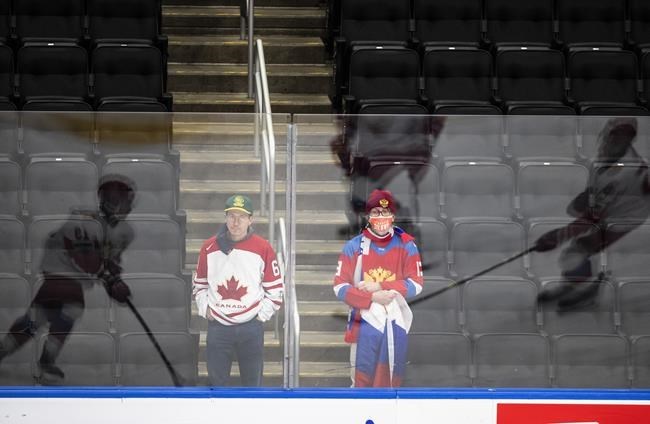Alberta is about to host a third pandemic International Ice Hockey Federation tournament armed with experience from the first two, but with the ice still shifting underfoot.
The 2022 world men's under-20 championship starting Sunday in Edmonton and Red Deer, Alta., faces the same challenge it did a year ago in Edmonton: how to bring hundreds of people together for a sporting event without becoming a spreader of the COVID-19 virus?
Vaccines, rapid testing advances, knowledge and data gleaned from completing both the 2021 world under-20 championship in Edmonton and the women's world championship in Calgary are tools Hockey Canada has now that it didn't a year ago.
The virus continues to interrupt sport, however, with the NHL taking an extended holiday break due to a number of vaccinated players and team personnel in COVID protocol. The Calgary Flames, for one, had 20 players and 13 staff in protocol heading into the break.
Thursday's exhibition pre-tournament game between the Czechs and the Swiss in Red Deer was cancelled due to COVID-19 protocol.
"We are confident in what we've put in place to be able to run the event, but we live on edge constantly looking at the Flames, looking at other NHL teams or pro sports in North America that have had good protocols as well and have had to have breaks," said Hockey Canada vice-president of events Dean McIntosh.
"We don't want that, we don't anticipate that, but on the flip side, we know that's a possibility at any time."
The number of active COVID cases, hospitalizations and people in ICU in Alberta is less than a year ago at the start of the 2021 championship that operated without spectators at Rogers Place.
The Omicron variant and allowing of fans into arenas for this tournament introduce new variables, however, into the operation of the 10-country event.
About 90 per cent of tickets to the 2022 tournament were already sold when Alberta followed other provinces in limiting capacity at sporting events to 50 per cent.
There were 8,359 active cases of COVID, 318 in hospital and 64 in intensive care in the province Saturday compared to 16,097 active cases, 836 in hospital and 173 in ICU a year earlier, according Alberta Health website statistics.
Those who bought tickets must show proof of full vaccination — a negative test will not suffice — to enter Rogers Place and Peavey Mart Centrium.
The movement and management of players, coaches, team staff and officials within the tournament will operate in similar fashion to the 2021 edition, which in turn adopted the bubble model of the NHL's 2020 playoffs in Edmonton.
They won't mix with the public and are confined to hotel, ground transportation and event level at each venue, McIntosh said.
Regular PCR testing augmented by rapid tests, the wearing of masks and wearable wristband tech for contact tracing are also among protocols, he added.
Two IIHF doctors are on site and each host city has a chief medical officer. University of Calgary infectious disease expert John Lam is a consultant for the tournament, McIntosh said.
Players and coaches who arrived in Canada under the federal government's International Single Sport Exemption were tested three straight days and quarantined for two upon arrival last week.
The majority are vaccinated, McIntosh said.
"Those competing in the event fall under the international exemption," he explained. "We know the status of all those individuals and how they test, but not all of them are fully vaccinated by Canadian standards.
"I would tell you by Canadian standards we run over 90 per cent fully vaccinated and by non-Canadian standards we run at 98 or 99 per cent probably, but we do have a couple that fall outside."
The IIHF cancelled six January tournaments, including the women's world under-18 championship a second straight year, over COVID concerns.
Canada's junior men's team opens the Pool A round robin Sunday against the Czechs at Rogers Place. Austria, Germany and Finland round out that pool.
Defending champion United States, Russia, Sweden, Slovakia and Switzerland comprise Pool B in Red Deer.
Canada takes on Austria on Dec. 28 with a game the following day against Germany before capping the preliminary round on New Year's Eve against the Finns.
The quarterfinals Jan. 2 and semifinals Jan. 4 precede the medal games Jan. 5 in Edmonton. Canada fell 2-0 to the Americans in the 2021 final.
The Canadian women's hockey team is also scheduled to play the U.S. women Jan. 3 at Rogers Place in the penultimate game of their pre-Olympic Rivalry Series.
The organizing committee's goal is to pull it all off without major disruption or teams forced to play short-handed.
The tournament had a rocky start last year. Sweden arrived without its regular coaching staff and a third of the German team remained in extended quarantine for its first three games because of positive tests for the virus.
"Confidence level? I would tell you until we get to January the fifth and the event is over and we award gold medals, my confidence level is always on edge, let's put it that way. You worry constantly," McIntosh said.
"We want to deliver a great event. That's our commitment to the IIHF and the Canadian fan."
This report by The Canadian Press was first published Dec. 25, 2021.
Donna Spencer, The Canadian Press



